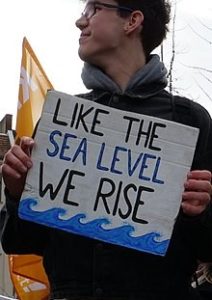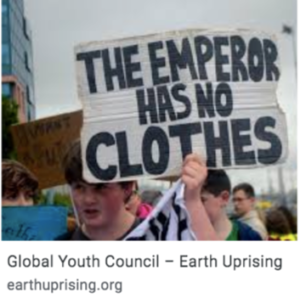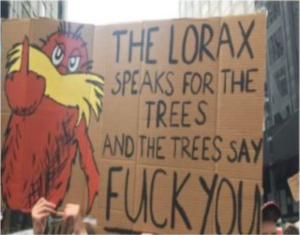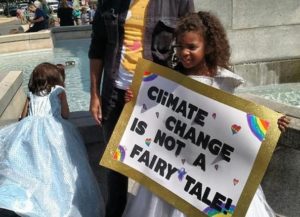Minds of the Movement
An ICNC blog on the people and power of civil resistance
by Elizabeth A. WilsonSeptember 30, 2019
Though Greta Thunberg is not the leader of the youth climate change movement (which defines itself as leaderless), she has emerged as an eloquent spokesperson and almost singlehandedly has fashioned a powerful moral narrative for the movement. This moral narrative gives the youth movement the potential to do what the traditional environmental movement has so far failed to do—catalyze mass action against climate change. This narrative calls out those in power for failing to protect children from the loss of their future.
The New Yorker called Thunberg’s rhetoric “uncanny.” Penguin Press rushed a collection of her speeches into press. She won Sweden's alternative Nobel Prize, the Right Livelihood Award, for her activism; has been nominated for the Nobel Peace Prize; and has spoken at Davos and before various parliaments. She sailed across the Atlantic in a carbon-neutral boat this month to attend the United Nations Climate Action Summit in New York and plans to attend COP25 in Santiago.
Why have her words resonated so powerfully? Strategic considerations seem to be driving Thunberg’s and the youth environmental movement’s messaging and communications: using powerful imagery, subconsciously resonating with pop culture, daring to push social boundaries, and evoking moral authority.
Powerful Imagery: “Our House is on Fire”
Thunberg and the youth movement generally have adopted powerful imagery that conveys complex meanings, with multiple layers, through metaphors and visualizations. The pithy slogan #FridaysforFuture encapsulates both the action and the reason for action in three short words.

Greta Thunberg in Washington, DC, on September 20, 2019. Source: Author.
Even where the images used were first devised by adults, they have taken on new meanings when spoken by young people. In Margaret Klein Salamon’s call for more urgent language to describe climate change, she uses the image of a “house on fire” as an analogy to provoke a different way of thinking about climate change: "Imagine there is a fire in your house. What do you do? What do you think about?" The youth movement has transformed this into a metaphor that works to suggest that the Earth is our house. Said Thunberg to the World Economic Forum: "I want you to act as if our house is on fire. Because it is."
The image of Earth as “our house” provides a way to re-envision the relationship of humans to nature. Instead of something to be dominated and controlled, as capitalism views it, the Earth is something that shelters and takes care of us.
Accordingly, the youth movement is highlighting the need to learn from indigenous people about co-existing with nature in a less destructive way. At the Washington, DC climate strike on September 20th, the first few speakers were all of indigenous American heritage. With almost the first words the audience was asked to “remember the steps you took to get here. The land you are standing upon is native land.”

Source: Youth Climate Movement via Twitter.
Messaging in the youth movement has also created an identification between the youth climate strikers and the planet itself, as in this sign, proclaiming, “Like the sea level, we rise.” This identification has a powerful surface level of meaning—to link the planetary distress reflected in rising sea waters with the rising resistance to global inaction on climate change: “The ice is wearing thin/Just like our patience.” To identify youth with the planet is to implicitly charge that the violence being done to the planet is also being done to youth, displacing the “victim” and reproaching adults.
Cultural Resonance: “The Emperor Has No Clothes”
Movement messages have greater impact when they resonate, perhaps unconsciously, with stories that shape the surrounding culture. One way the youth movement resonates is with Hans Christian Anderson’s well-known fairy tale, “The Emperor’s New Clothes.”
In that tale, an Emperor neglects his duties because of his love of fine clothes. One day, two thieves come to town and tell the Emperor that they can fashion a beautiful suit out of the finest materials, except that the suit would be invisible to anyone who is unfit for their job or very simpleminded. The two thieves ask for the finest silk and pure gold thread. But instead of sewing, they steal the materials, stuffing them in knapsacks, and then only pretend to sew on empty looms.
 They keep pretending, day after day, stealing more and more fine materials from the realm. The Emperor’s advisors—and the Emperor himself—can’t see anything—because there is nothing there!—but they are afraid to seem unfit or stupid, so they pretend to see the wonderful patterns and beautiful colors that the lying thieves describe.
They keep pretending, day after day, stealing more and more fine materials from the realm. The Emperor’s advisors—and the Emperor himself—can’t see anything—because there is nothing there!—but they are afraid to seem unfit or stupid, so they pretend to see the wonderful patterns and beautiful colors that the lying thieves describe.
Eventually, the Emperor plans a parade to show off his new suit and the entire community falls for the trick. They see the Emperor walk down the street in his underwear but nonetheless yell out compliments about his “new clothes.” It is only a young child that is not afraid to say the truth: “But the Emperor has nothing on at all!”
The two thieves are the fossil fuel industries. The silk and gold thread are carbon fuels, riches being stolen from the earth. The Emperor and his advisors are the politicians and journalists. The people are the ordinary people being neglected and stolen from. All are denying what is before their eyes—that the world is on fire, our planet is dying, and that young people may inherit an Earth that is unrecognizable.
Thunberg is that child, finally saying the emperor has no clothes.
Pushing Social Boundaries: “You Grownups Don’t Give {an Expletive} about My Future”

Source: me.me
Speaking to the National Assembly in Paris, Thunberg read off numbers from the last IPCC on the “carbon budget” within which it is necessary to stay if the world were to have just a 67% chance of staying below 1.5 degrees of warming and called out our collective denial:
"And not once, not one single time have I heard any politician, journalist or business leader even mention these numbers. It is almost like you don't even know they exist, as if you haven't even read the latest IPCC reports on which the future of our civilization is depending."
She is not the first to say that the future of today’s youth and children is being imperiled by the inaction of governments and the rapacity of the fossil fuel industry. School strikes happened in 2015. Aided by the non-profit law firm Our Children’s Trust and others, young people have been petitioning and suing state and federal governments, in the United States and beyond, for inaction on climate change for some years now.
But lawsuits and petitions move slowly and are written in dry legalese. At her first school strike in 2018, Thunberg passed out fliers that, roughly translated, contained the accusation: "You grownups don’t give [an expletive] about my future." When social boundaries are preventing action on climate change, the youth respond by pushing social boundaries.
Moral Authority: The Future Belongs to Youth

Source: Author.
The youth movement to combat climate change reverses the usual pattern seen in people power movements, which are often led by adults motivated to make change on behalf of their children’s futures. Here the children are shaming the adults for failure of leadership and claiming moral authority. Addressing the COP24 leaders, Thunberg stressed that roles are being reversed:
"You only speak of green eternal economic growth because you are too scared of being unpopular….
You are not mature enough to tell it like it is. Even that burden you leave to us children. But I don't care about being popular. I care about climate justice and the living planet."
Youth have the ultimate moral authority on this issue, because the future belongs to them. They understand the truth of what is before their eyes—the storms, the floods, the fires—unlike adults, who are continuing to believe the lying thieves. Astonishingly, in this age of disinformation, the youth believe in science and facts.
At the climate strikes on September 20th in Washington, DC, a father carried his three-and-a-half-year-old daughter on his shoulders, saying, “When she found out she not allowed to go to the climate strike with her two sisters, she called a hunger strike and refused to eat breakfast.” Two small girls came to the march in their princess dresses, carrying a sign saying, “Climate Change is Not a Fairy Tale.”
Let’s hope that the ending to this fairy tale is different from the original. In the Hans Christian Andersen story, the Emperor is too worried about public relations to cancel the parade. So, he continues walking on. In his underwear.

Elizabeth A. Wilson
Elizabeth A. Wilson is the author of People Power and International Human Rights: Creating a Legal Framework (International Center on Nonviolent Conflict, 2017). She is a human rights lawyer, currently visiting scholar at Rutgers Law School-Newark and formerly Assistant Professor of English at Yale University.
Read More